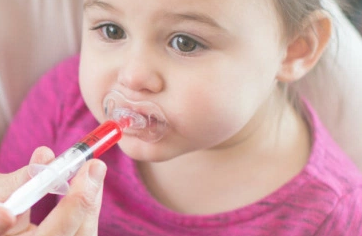It Is Medication Safety Week! Learn How to Give Medicine to a Baby

Dr. Agnes Scoville
It is Medication Safety Week and we interviewed Dr. Agnes Scoville, an emergency medicine doctor in Los Angeles, California, to discuss medication safety with babies. According to Dr. Scoville, “Many medical studies show that babies frequently get the wrong dose of medicine, in part because they spit it out. Up to 50% of babies receive the wrong dose of medicine, leading to under, or worse, overdosing.” Learn how to give medicine to a baby safely with the tips below!
How do I handle my baby’s medicine safely?
Make sure:
- The medication has been stored properly. Refrigeration is critical for some medications.
- Check the expiration date on the package.
- You understand the directions – ask your pharmacist or doctor if you have any questions.
- Wash your hands before handling the medicine.
What is the best way to measure the right dose of medicine for my child?
The AAP (American Academy of Pediatrics) and the CDC (Centers for Disease Control) both recommend that liquid medicine for babies be given in milliliters only. Use a standard oral syringe to measure the medicine. Teaspoons and tablespoons are confusing and inaccurate.
As in construction, always measure twice. After you draw up the medicine, check the measurement again. Put the medicine in the side of your baby’s mouth, but be warned the taste will be strong and he or she might spit the medicine right back out. Try a pacifier with a liquid medicine dispenser, like Pacidose.
How else can I get my baby to take the medicine without a fight?
Give the medication when your child is hungry. And remove any distractions from the room. Sit down in a chair and hold your baby so you can easily introduce the medicine. If you are relaxed your baby will be relaxed.
Why can’t I just put the medicine in my baby bottle?
Here’s the problem. What if your baby then doesn’t drink the whole bottle? Then you still have the same issue: you don’t know how much your baby got because it’s now diluted with other liquid.
What if my baby spits up even something easy like Tylenol?
Try all the techniques above. If your baby has actually swallowed the medicine and is vomiting it back up, it becomes a little trickier. Most liquid is absorbed from the stomach in about an hour. If that time has past your child likely retained the full dose. If less time has passed, call your doctor to determine a re-dosing schedule or ask for a suppository.
What about over the counter cold and flu medicine for my baby?
Avoid over the counter medicines for your young child. Many studies show that cold medications for kids under 6 are not helpful and may be harmful. You should check with your doctor for any medications that are not specifically recommended. A better way to treat runny nose, cough, and congestion is lots of TLC, fluids, rest and room humidifiers.
What questions should I ask my doctor when a medicine is prescribed?
Here are some questions the FDA recommends that you ask when your doctor prescribes a medication:
- What is the drug, and what is it for?
- Will the drug interfere with any other medications my child is taking?
- How many times a day will my child need to take this medication, and how long does she need to be on it?
- Are there any side effects I should expect or be concerned about?
- What if my child misses a dose?
- How soon will symptoms improve?
- Is there a less expensive generic alternative that’s as effective?
Also, when you pick up the medicine from the pharmacy, look at the bottle, and make sure it makes sense to you. Pharmacists are a great resource for you and your baby and are right there for questions when you pick up the prescription. And pharmacists can call the doctor just to double check if there is any question or concern about the medicine or the dose.
Lastly, it goes without saying but I will say it. Keep all medicines and nonfood items out of reach of your kids. Be smart with you little ones.
Thank you to our generous sponsors Larry Schur and All Baby & Child, Inc.




